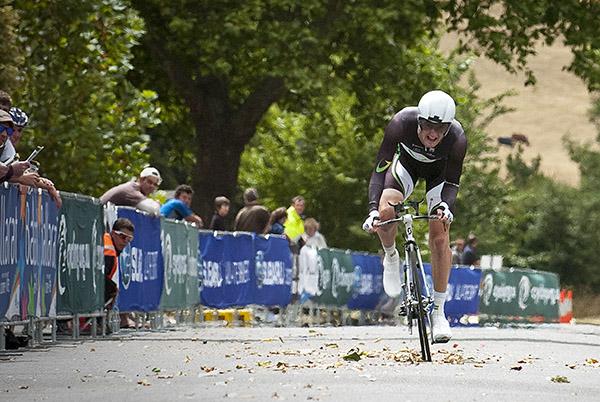GreenEdge use of radio questioned in Australian Time Trial Championship
Commissaires overturn national regulation hour before start

Cyclingnews has learned GreenEdge applied "pressure" to the commissaires panel prior to the elite men's individual time trial at the Mars Cycling Australia Road National Championships at Learmonth on Tuesday. Luke Durbridge (GreenEdge) won the gold medal ahead of teammate and two-time defending champion Cameron Meyer and Michael Rogers (Sky).
"Stevo [Neil Stephens] was in my ear the whole way and it was getting quite annoying actually, I just wanted to finish," Durbridge laughed in a post-race interview.
One entrant approached Cyclingnews, not wishing to be identified, raising their concerns with the late decision. The rider made clear that their anonymity was due to the fact that they did not want to be seen as "whinging" about the final result.
Cycling Australia technical regulations state that: During races the use of radio links or other means of communication with the riders is not permitted.
Discussion was raised with the commissaire's panel during the women's event and a decision was made prior to 1pm with the men's event starting at 2pm.
Cyclingnews spoke to Chief Commissaire Peter Tomlinson about the adjudication.
"It was opened up for the elite men after some pressure from a particular WorldTour Team," Tomlinson explained, later confirming that the team in question was in fact GreenEdge.
The latest race content, interviews, features, reviews and expert buying guides, direct to your inbox!
"We made an effort to go around and tell as many [teams] as possible."
Asked whether everybody racing was informed, Tomlinson admitted he "can't say yes or no."
Tomlinson did not believe that the decision to allow radios resulted in some riders having an advantage.
"I think radios in a time trial is just a means of getting communication," he told Cyclingnews. "The others had speakers and they were able to get detail from the car so everybody was able to have a following car and have means of communicating. That would be a bit of a harsh call to say that affected the result in any way."
Apart from any advantage gained from the use of radios, concern was raised over the timing of the decision, with smaller teams and individual entrants not bringing radio equipment with them. Tomlinson agreed that this was an issue, "Because then people probably didn't have the equipment with them and things like that," he said.
As a sports journalist and producer since 1997, Jane has covered Olympic and Commonwealth Games, rugby league, motorsport, cricket, surfing, triathlon, rugby union, and golf for print, radio, television and online. However her enduring passion has been cycling.
Jane is a former Australian Editor of Cyclingnews from 2011 to 2013 and continues to freelance within the cycling industry.